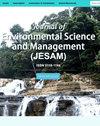气候变化下家庭社会脆弱性指数评估——以菲律宾拉古纳省为例
IF 0.3
4区 环境科学与生态学
Q4 ENVIRONMENTAL SCIENCES
引用次数: 0
摘要
本研究实证调查了菲律宾拉古纳省两个市镇在气候变化相关自然灾害影响下的社会脆弱性。数据来自对17名专家的访谈和对两个市镇37户家庭的调查。使用加权平均法和有序probit回归的指数分析结果可以总结如下:首先,低教育程度、低劳动率和缺乏经济资源的特征在确定家庭的社会脆弱性类别时至关重要。第二,社会脆弱性指数是由多个因素决定的,因此不应该由单一变量来评估。第三,脆弱性指数各组成部分的权重受地理特征以及专家的专业和个人特征的影响不大。这表明,地方政府应开发一个信息系统,识别社会弱势家庭,并利用该系统向居民提供有关气候变化的教育,以及家庭减少严重气候事件潜在风险的策略。本文章由计算机程序翻译,如有差异,请以英文原文为准。
Index Assessment of Household Social Vulnerability to Climate Change: A Case Study of Laguna Province, Philippines
This study empirically investigated the social vulnerability of two municipalities of Laguna Province, Philippines, on the impacts of natural disasters associated with climate change. Data were obtained from interviews with seventeen experts and surveys for thirty-seven households conducted in the two municipalities. The results of the index analysis, using the weight average method and ordered probit regression, can be summarized as follows: First, the characteristics of low educational attainment, low labor rate and lack of economic resources were crucial in determining the social vulnerability class of households. Second, the social vulnerability index is determined by multiple factors, and therefore, it should not be assessed by a single variable. Third, the weights for components of the vulnerability index were insignificantly affected by geographical features and the speciality and personal traits of the experts. This suggests that local governments should develop an information system that identifies socially vulnerable households and that this should be utilized to provide the residents with education about climate change and strategies for households to reduce their potential risks from severe climatic events.
求助全文
通过发布文献求助,成功后即可免费获取论文全文。
去求助
来源期刊

Journal of Environmental Science and Management
ENVIRONMENTAL SCIENCES-
CiteScore
0.90
自引率
0.00%
发文量
10
审稿时长
2 months
期刊介绍:
The Journal of Environmental Science and Management (JESAM) is an international scientific journal produced semi-annually by the University of the Philippines Los Baños (UPLB).
JESAM gives particular premium to manuscript submissions that employ integrated methods resulting to analyses that provide new insights in environmental science, particularly in the areas of:
environmental planning and management;
protected areas development, planning, and management;
community-based resources management;
environmental chemistry and toxicology;
environmental restoration;
social theory and environment; and
environmental security and management.
 求助内容:
求助内容: 应助结果提醒方式:
应助结果提醒方式:


